The Python language has become one of the most sought-after skills of the 21st century, as its usage in data science and artificial intelligence emerged. Python is one of the most popular programming languages today.
Learning Python creates opportunities for you to obtain a higher income. According to Indeed, Python developers could earn as much as $111,806 a year on average in the United States. The trend is moving upward, as well.
One fantastic thing about Python is that you can master it online. You could start from the beginner level and become an adept coder at the end.
Currently, there are thousands of Python courses available. In this fast-paced world, you may not have enough time to sort out the best Python courses.
Thus, I decided to do the heavy lifting for you. I select the most practical and helpful Python 3 online courses and break down each of them in an insightful way. You will only be left with a list of 10 courses.
This new list is now manageable; now, it is much easier to find the best Python course that meets your needs. It would undoubtedly save you time and money.
Let’s start!
Things You Should Know
First of all, I have separated the list of the best Python courses into groups. I understand that my readers are all different, so it would be best to select ones that suit your level and learning style.
The groups are
- Python Basics/Core Python
- Advanced Python
- Python for Data Science
- Free Python Courses
As these courses serve different purposes, they have distinct prerequisites. I will state them clearly when I discuss each course below.
Another thing you need to understand is that each Python course is not the same since instructors taught in different ways (mainly theoretical or project-based).
For this part, it’s subjective. I don’t think there is the best online Python course that fits everyone. For example, I prefer project-based courses, as the course “forces” me to code independently, which is very important in programming.
Affiliate Disclosure: This post from Victory Tale contains affiliate links. If you purchase Python courses through them, we will receive a small commission from course providers.
Still, as we always value integrity and prioritize our audience’s interests, you can rest assured that we will present each course truthfully.
Python Basics/Core Python Courses
Courses in this group will teach you the basics of the Python programming language. For example, you will learn the syntax and understand it by heart.
To complete beginners in Python or programming, I suggest selecting 1-2 courses from this group before proceeding to specialty courses.
1. 100 Days of Code – The Complete Python Pro Bootcamp for 2023
100 Days of Code is unarguably one of the best Python 3 courses offered by Udemy. The creator is Angela Yu, lead instructor of App Brewery, one of London’s finest programming Bootcamp.
The course is project-based. The instructor mentions that it aims to simulate the real Bootcamp experience. You will spend the majority of your time coding on your own. Please be prepared!
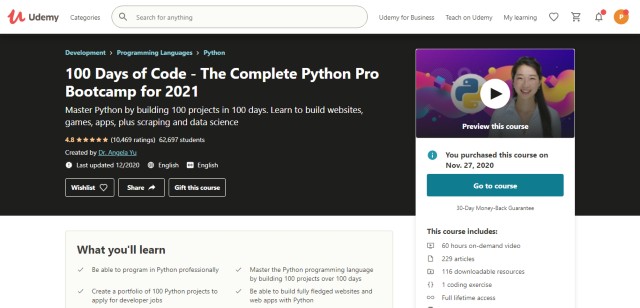
Course Content
- Install Python and other relevant software
- Variables and Data Types
- Conditionals and Loops
- Python Functions
- Lists and Dictionaries
- Debugging
- Object-Oriented Programming (OOP)
- Files, Directories, Paths and Working with CSV Data
- Building a GUI Application and an API (Using Tkinter)
- Web Development in Python – You will build and deploy your first web application in this part. Noted that you will learn a crash course on HTML and CSS here, so you don’t need to learn them beforehand.
- and many more
The instructor hopes you can complete all of these in 100 days. However, based on my experience, completing the course in 100 days is extremely difficult.
This is because each lesson is filled with numerous real-world projects, quizzes, and coding challenges. I ended up spending 2-4 extra hours for every hour of video lessons.
Course Length: 60 Hours, Ratings: 4.7/5.0, Students: 798000+
Pros and Cons
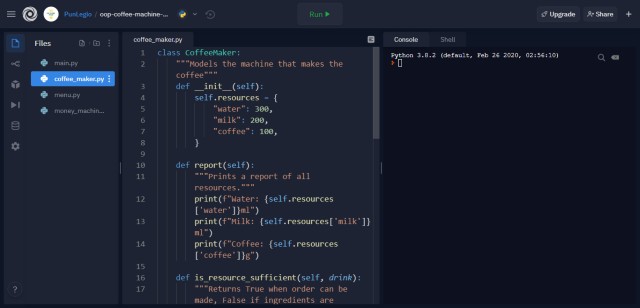
Pros
- The instructor is great at explaining theory and projects alike. She uses many interactive tools to help you understand the materials.
- Clear and understandable accent
- Well-structured curriculum: You will start coding very early in the course.
- Most lessons are highly engaging to learn.
- Excellent real-world projects that are beneficial for both absolute beginners and experienced developers to practice. Beginners will receive more hints.
- Responsive Q&A Forum
- Lifetime Access
Cons
- As you progress, the instructor will gradually reduce the explanations for each topic. In the end, she will only provide projects for you to complete with no detailed video solutions at all. This is intentional, as she wants students to learn from the documentation as Python developers do in real life. However, I’m not too fond of it.
- Some parts on the intermediate level are extremely boring.
Overall, this is a good choice for those who want to learn Python online, especially learners with no prior programming experience.
2. The Modern Python 3 Bootcamp
For anyone looking for a great theoretical Python 3 course, it is worth checking The Modern Python 3 Bootcamp by Colt Steele, a Bootcamp instructor at Galvanize.
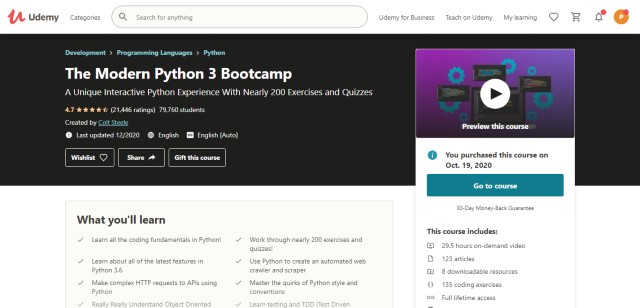
Course Content
Colt explains Python basics in great detail. Below is what you will learn from this course.
- Command-Line Fundamentals (MAC/LINUX/WINDOWS)
- Python Setup for MAC and Windows
- Variables, Strings, Integers
- Conditionals (If, elif, else) and Loops (For, while)
- Lists and Dictionaries
- Tuples and Sets
- Functions and Lambda Functions
- Debugging and Error Handling
- Object-Oriented Programming (OOP)
- HTTP Requests with Python + API Project
- Web Scraping Project
- SQL Basics
- and many more
Overall, the course captures the essence of Python programming up to the intermediate level. The total length of this on-demand video course is 29.5 hours. Additionally, there are 200 quizzes and coding exercises, and a few projects for learners to complete.
Course Length: 29.5 Hours, Ratings: 4.7/5.0, Students: 79800+
Pros and Cons
Pros
- The instructor is highly knowledgeable and has strong teaching skills. Everything he explains is effortless to understand. I also like his humor.
- The course is well-structured. The material is progressing from basic to advanced as it should be.
- Everything is explained in great detail.
- Video lectures are accompanied by slides, which you can use to review later.
- Useful real-world projects at the end.
- Generally a great python introductory course.
- Lifetime Access
Cons
- The boring stuff is at the beginning and a bit lengthy. Thus, it will take you a while before you can start Python coding.
- There are too few coding exercises to help you master Python. You will need another project-based course.
- Colt may not update the content as frequently as other instructors.
Course Length: 29.5 Hours, Ratings: 4.7/5.0, Students: 87000+
3. The Complete Python Bootcamp From Zero to Hero in Python
Some or most content on this course are likely to be outdated, since the instructor has not updated the course since 2021.
This is the most popular Python course on Udemy by a wide margin. With almost 1.2 million students, this course was created by Jose Portilla, Head of Data Science at Pierian Data Inc.
Jose’s course is concise compared to the first two courses I recommend. If you want a fast Python tutorial, this course is for you.
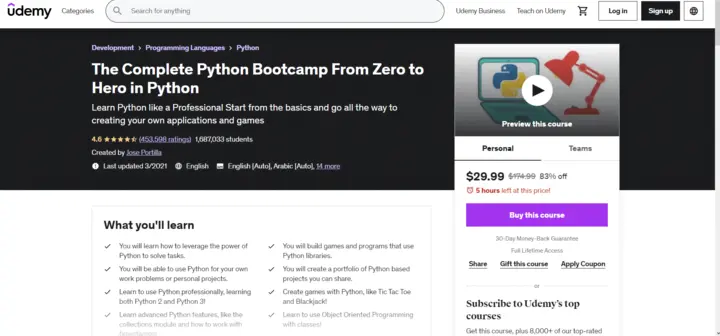
Course Content
- How to use Jupyter Notebooks and create .py files
- Objects and Data Structure Basics (from Strings to Dictionaries and Tuples)
- Conditionals and Loops
- Functions and Methods (Lambda Functions Included)
- Object-Oriented Programming
- Python Decorators and Generators
- Web Scraping and Sending Emails with Python
Apart from video lectures, you will also receive a notebook for review and practice exercises and quizzes.
Course Length: 21 Hours, Ratings: 4.6/5.0, Students: 1322000+
Pros and Cons
Pros
- Knowledgeable Instructor
- Clear explanations
- Well-structured curriculum
- Thoughtful assignments
- Good supplementary course materials
- Lifetime Access
Cons
- Some parts are far too concise for new programmers, especially those in the second half.
- Jose is inconsistent with his teaching pace. He can be too fast or too slow.
- Exercises and assignments are quite few.
4. Complete Python Developer in 2022: Zero to Mastery
For everyone who loves to learn by doing, you also want to check this course by Andrei Neagoie, an experienced software developer.
This course teaches you how to build 12+ real-world Python applications from scratch. However, the course is not purely project-based. You will learn the basic features as well.
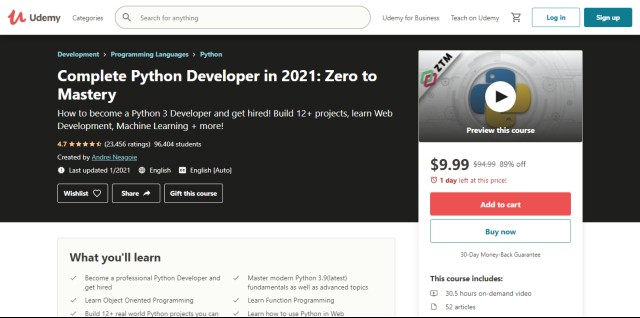
The course content has two main parts, core concepts and practical aspects like below:
Course Content
- Fundamental programming concepts, Python Interpreter, Difference between Python 2 and 3
- Summary of Data Types
- Conditionals, Loops, Functions + How to write a clean code
- Introduction to prominent developer environments: Pycharm, Jupyter Notebooks, VS Code and Sublime Text
- Object-Oriented Programming and Functional Programming
- Decorators, Generators and Error Handling
- Modules: Debugging and Testing in Python
Practical Aspects:
- Scripting in Python (Image Processing, Sending Emails, Creating a Password Checker, Building a Twitter Bot)
- Build a Web Scraper (Using BeautifulSoup Python Library)
- Web Development with Python (Using Flask)
- Automated testing using Selenium
- Build basic machine learning models
Andrei’s course is a great introduction for everyone who wants to become a Python developer. Both essential basics and Python key features and usages are included adequately in this single course.
After completing this course, you are more than ready to take on Python’s advanced concepts and applications.
Course Length: 30.5 Hours, Ratings: 4.7/5.0, Students: 114000+
Pros and Cons
Pros
- Highly knowledgeable instructor
- Andrei frequently updates the content. Thus, it is unlikely to be outdated.
- Moderate, step-by-step pace
- Clear explanations
- Well-structured curriculum
- Lifetime Access
Cons
- Some reviewers believe the assignments and exercises are too few.
- Some parts apparently lack depth. If you want to know more about them, you will need to buy another course.
5. The Complete Python Course | Learn Python by Doing
If you want an online Python course that teaches you how to use Python like a professional, this course is among the best you could have. The creator of this course is Rob Percival, a Cambridge-graduate web developer.
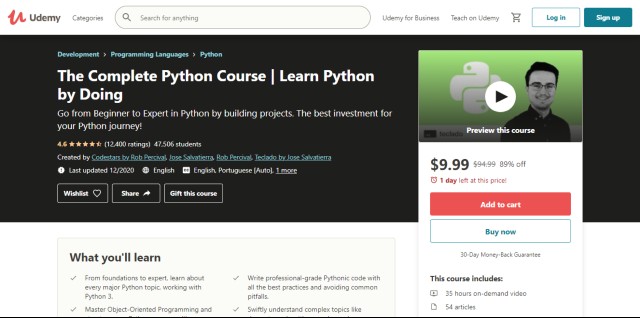
Course Content
Rob will teach you the basics. Below is what you will learn from the course.
- Introduction to Python (Numbers, Strings, Boolean, Lists, Dictionaries, Tuples, and Sets)
- If Statements, For/While Loops, Functions, Arguments and Parameters
- OOP in Python
- Dealing with Errors and Files
- Database in Python (Using SQLite)
- Asynchronous Python Development
- Web Scraping with Python + Browser Automation (Using Selenium)
- Python Web Development (Using Flask)
- GUI Development with Tkinter
- Data Structure and Algorithms in Python (Big O, Binary Trees, Nodes)
- and many more
This online Python class is an excellent blend of concepts and hands-on training. Every lesson is full of coding practices that help improve your understanding of the content.
Moreover, there are milestone projects to showcase how well you learn and improve your skills to use Python in real life.
For example, you will build a currency exchange program by interacting with the REST API. Furthermore, you will also work on your personal scraping app.
Rob also offers guidance to avoid common pitfalls and develop good habits for you to become a better Python developer. If you want to become one, this course is a must-buy.
Course Length: 35 Hours, Ratings: 4.6/5.0, Students: 56000+
Pros and Cons
Pros
- Balanced, In-depth curriculum
- Clear and engaging explanations
- Good exercises and assignments
- Excellent course materials (interactive screencast videos, written notes, and many more)
- Include guidance on common pitfalls and best practices
- Lifetime Access
Cons
- Some reviewers noted that parts regarding other programming languages are not explained adequately, leaving them confused.
6. Python for Everybody Specialization
Python for Everybody Specialization is a course created by the University of Michigan that teaches Python to complete novices. Therefore, a programming background is not necessary at all.
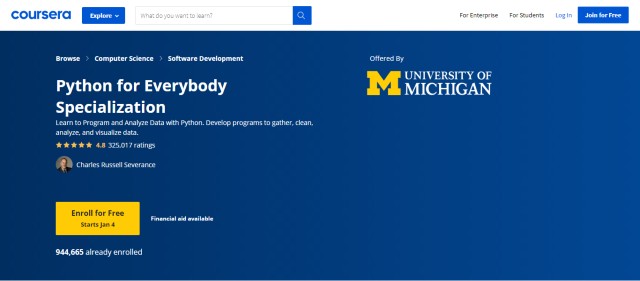
Course Content
Interestingly, this specialization is based on a book with the same name and comprises five courses:
1. Getting Started with Python: This course introduces you to the world of programming. You will understand why we need to program in real life.
Subsequently, you will learn about Python basics such as variables, integers, strings, conditionals, functions, and loops.
2. Python Data Structures: This course will discuss strings, lists, dictionaries, sets, and tuples.
3. Using Python to Access Web Data: In this course, you will completely understand how to manage and retrieve various web data types. Furthermore, you will work with different data formats (HTML, XML, and JSON) in Python.
4. Using Databases with Python: This course will teach SQL basics, methods to build web crawlers and visualize your data.
5. Capstone: The end of your learning journey in this specialization. This project course tests your skills acquired throughout the four courses above. You will retrieve, process, and visualize assigned data using Python.
Overall, this course is a perfect first course for anyone who wants to pursue data science career tracks, especially those who want to learn in a university-style environment.
The instructor noted that you should spend 3 hours a week for eight months to complete this specialization. If you are a fast learner like me, this is going to be tedious. Hence, it would help if you consider enrolling in a Udemy course over this specialization.
Similar to other Coursera courses, you can audit this course entirely free, but your assignment will not be graded, and you will not receive a certificate.
I don’t care much about the certificate (unless you want to show them on your resume), but I believe it is worth getting your homework graded by experts to be confident that you are on the right track.
Are you feeling convinced? Coursera allows you to take this course for free for seven days. If you are happy about the learning experience, the monthly membership will cost you $49/month.
Pros and Cons
Pros
- Learn with a faculty member of a leading university
- Engaging, bite-sized lectures and presentations
- Well-organized curriculum
- Excellent course materials
Cons
- Some assignments can be too challenging for absolute beginners.
- The pace might be too slow for those with programming experience.
Advanced Python Courses
I recommend taking these advanced Python courses if you are a learner who has a strong interest in Computer Science or wants to know more about advanced Python features.
After finishing these courses, which is not easy to do so, your Python programming skills will skyrocket to an expert level.
7. Python 3 Deep Dive (4 Courses)
Suppose you are serious about learning Python and want to understand every complicated aspect of this programming language. In that case, this series of courses by Fred Baptiste on Udemy is a must-buy.
Unlike other courses that only touch the surface, these four courses delivered an in-depth view of the Python language. You will understand how each component works (like an engineer!)
However, these courses are not for one with no programming skills. You will need a moderate background in Python to start taking them.
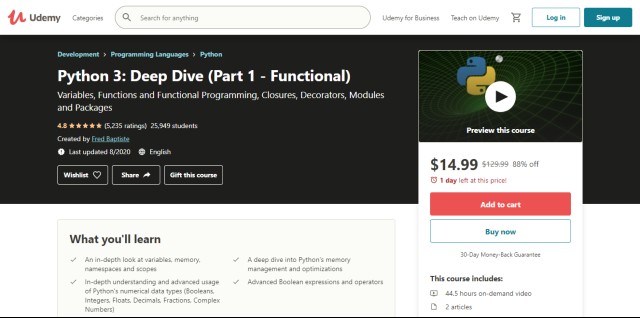
Let’s see what these four courses will teach you:
Part I (Functional)
This part discusses the inner mechanics of variables, numeric types, functions, scopes, decorators, tuples, and many more. You will also understand how to optimize the code efficiently.
The instructor will switch back and forth between the lecture and coding. This enables learners to experience both concepts and practicals.
Length: 44.5 Hours Ratings: 4.8/5.0 Students: 25,800+
Part II (Iteration, Generators)
Part II will focus on how sequences, iterables, context managers, and generators work in Python and the relationships between each one.
Unlike Part I, Part II is project-intensive. Each part of the course has a project for learners to complete. In total, you will have six high-quality projects to improve your skills enormously.
Length: 34.5 Hours Ratings: 4.8/5.0 Students: 17,100+
Part III (Hash Maps)
This part is devoted to explaining Python dictionaries, sets, and related data structures. The instructor also discusses serialization and deserialization of dictionaries to JSON and specialized dictionaries such as DefaultDict and OrderedDict.
These are complex concepts that you could not find in other courses.
The course format is similar to Part I. However, you will have more coding practices with solutions to help you understand these sophisticated materials.
Length: 20.5 Hours Ratings: 4.9/5.0 (I have never seen this high.) Students: 12,300+
Part IV (OOP)
The last course in the series focuses solely on Object-Oriented programming. Suppose you are always confused about the Python class. This course is your first choice to take.
However, Fred doesn’t stop at Python classes. He will introduce OOP concepts such as Polymorphism, Single Inheritance, Descriptors, Enumerations. Finally, he will conclude the course with Metaprogramming.
You will also have six projects to finish as in Part II, along with many opportunities to write python code on your own.
Length: 35 Hours Ratings: 4.8/5.0 Students: 11,200+
To conclude, Python 3 Deep Drive is probably the most comprehensive and advanced online Python course I have ever seen. If you manage to finish all the materials, I am confident you are more than ready to apply for a Python programmer position.
Pros and Cons
Pros
- Cover advanced Python syntax and other concepts in detail
- Informative lessons with clear explanations
- Several challenging projects to complete
- Highly knowledgeable instructor
- Best for students who want to understand how Python works
Cons
- Some parts of the courses can be particularly challenging even for experienced programmers.
- Few explanations are repetitive.
Best Python for Data Science Courses
What I will discuss next is the best Python for Data Science courses. You will learn Python and use it in data science tasks, such as data analysis and data visualizations.
These courses will not focus on the core of the Python Programming language. In other words, the instructor would teach you only python basic concepts (variables, strings, conditionals, etc.).
Subsequently, he will skip OOP and other advanced computer science stuff, then move to NumPy, Pandas, and other data-science-related Python libraries.
Each course will have different prerequisites. If you are an absolute beginner, I suggest taking a core Python course (numbered 1-6 in this list) before taking any “Python for data science courses,” unless indicated otherwise.
This is because Python fundamentals taught in almost all “Python for data science courses” are too brief to help you possess sufficient Python skills to tackle data science. You might get lost in the sea of code when you reach the NumPy and Pandas libraries.
8. Programming for Data Science with Python
If you are looking for an online programming course, which provides a marvelous learning experience similar to bootcamps, you should not look elsewhere besides Udacity.
Regarding the Python programming language, Udacity offers a nanodegree named Programming for Data Science with Python. This program is intended for beginners. Thus, beginners can safely take it without any background knowledge required.
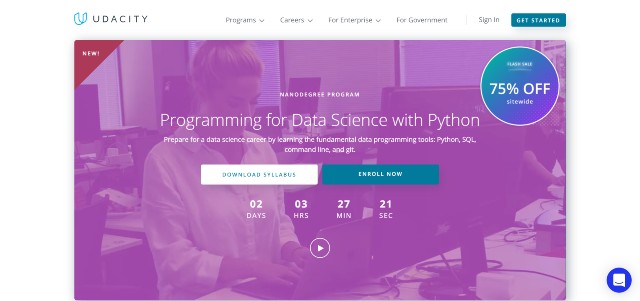
Course Content
This Udacity program will Python knowledge and other skills required to start your journey in data science. The program comprises three sections as follows.
1. Introduction to SQL – The first section will cover SQL fundamentals such as JOINs and aggregations and learn how to use the database to solve business problems.
2. Introduction to Python Programming – The second section will introduce you to Python. You will learn about variables, conditionals, loops, functions, and many more. In the end, the instructor will explain how to use NumPy and Pandas to work with data.
3. Introduction to Version Control – The final section will explain version control and how to use Git and Github.
Each section will have quizzes, assignments, and a real-world project to complete. Thus, you will have sufficient hands-on experience that you can develop upon.
Similar to web development bootcamps, you will gain access to various types of student support, including the following:
- Mentor Support – You can ask any question to your mentor 24/7, including those you have when you get stuck on coding challenges. On average, students receive a reply back in less than an hour, which is extremely fast.
- Project Reviews – You can send unlimited requests to industry experts to review your projects. They will provide feedback, valuable suggestions on best practices, and many more.
- Career Services – The team will review your resume, Github portfolio, and LinkedIn profile to ensure that you are well-prepared for job applications
Compared to other Python courses, Udacity requires more commitment. You should spend as many as 10 hours per week for three months on the program.
The tuition for the course is $399 per month. If you pay in full for a 3-month access, you will get a 15% discount, lowering the fees to $339 per month.
However, Udacity frequently offers discounts and financial support, which could reduce program fees by 75%. Therefore, you are very likely to pay only $100 per month for the entire program.
[sc name=”udacity” ][/sc]Pros and Cons
Pros
- Comprehensive Python for Data Science course
- Informative, detailed lessons
- Several real-world projects to complete
- High-quality course materials
- Excellent support, including mentors, project reviewers, and career advisors
Cons
- Expensive than other online Python courses
- High commitment, thus might not be suitable for full-time employees
9. Python for Data Science and Machine Learning Bootcamp
Some or most content on this course are likely to be outdated, since the instructor has not updated the course since 2020.
This course by Jose Portilla teaches you how to use Python in data science and machine learning. You will start with Python language basics and end with Spark and deep learning with various Python libraries in between.
The video content has four parts with 25 hours in total length.
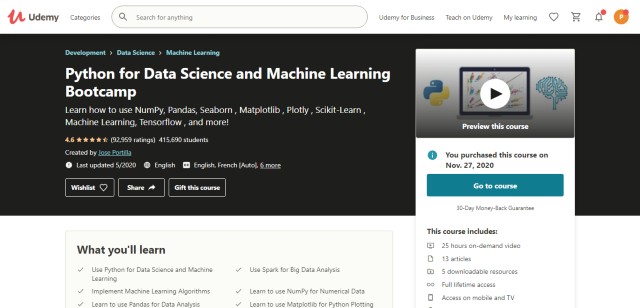
Course Content
Part I: Basics
- Set Up Jupyter Notebook
- Python Basics (This part is 84 minutes long, obviously inadequate for a novice. However, Jose already mentioned that this course is not for an absolute beginner. Thus, you will need to take at least one Python online course beforehand.
Part II: Python for Data Analysis
- NumPy: Arrays, Indexing, Operations
- Pandas (A major Python library for data analysis): DataFrames, Merge, Join, Concatenate, Groupby, Dealing with missing data
Part III: Python for Data Visualization
- Matplotlib
- Seaborn – Distribution Plots, Categorical Plots, Matrix Plots, Regression Plots
- Plotly/Cufflinks/Geographical Plotting
Part IV: Machine Learning
- Linear/Logistic Regression
- K-Nearest Neighbors, Decision Trees, Random Forests, SVM Theory, K Mean Clustering
- Build Recommender Systems (A system that provides recommendations to visitors)
- Natural Language Processing with Python
- Deep Learning (You will use Tensorflow and Keras)
- Big Data and PySpark
Length: 25 hrs, Ratings: 4.6/5.0 Students: 459000+
Pros and Cons
Pros
- Well-structured course
- Highly comprehensible accent.
- Bite-sized lectures
- Cover a wide range of topics
Cons
- The assignments are too easy.
- Many topics included in the course are very shallow. I am certain you cannot create complex ML models by completing this course alone.
From an overall perspective, if you want a general overview of every sound Python library and machine learning algorithm, you should consider this course.
In contrast, if you want to deep dive into each topic, such as Pandas. This course is not for you. You should take other Pandas courses (see below) instead.
10. Datacamp Python Courses
Datacamp is a platform that specializes in teaching data science. Unlike Udemy and Coursera, Datacamp does not teach by lecturing students.
Each chapter will have a brief video by experts to guide learners. Mainly, you will learn Python programming by completing numerous assignments on its interactive platform.
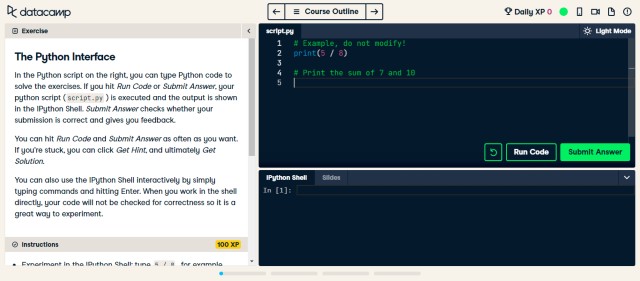
There are dozens of Python courses in Datacamp. Each of them is grouped into skill tracks. You can choose which track you want to pursue. For instance, I can select a Data Scientist Track if I want to become a data scientist.
However, please keep in mind that courses in each track overlap. This means, in total, there is far less content than it seems.
Secondly, Datacamp courses teach Python for data science, not for computer science. If you want a comprehensive course for the Python language, you should find better choices elsewhere.
Pricing
Datacamp uses a subscription model. Currently, there are two paid plans as follows:
- Premium – starting at $12.42 per month (billed annually)
- Teams – $25 per month
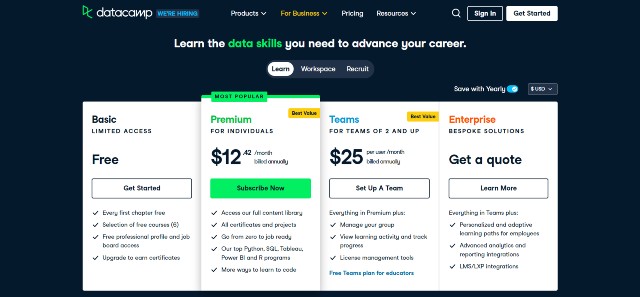
For learners interested only in Python for Data Science, subscribing to the Premium plan is more than enough, as you will gain access to the all courses and projects on the platform (335+ of them.)
Datacamp lets you try the first chapter of each course for free without providing credit card details.
Pros and Cons
I never subscribed to Datacamp, but I accessed Premium content for weeks when Datacamp provided free access.
Pros
- Extremely beginner-friendly. Every Python course is designed to make users feel comfortable learning.
- Great app to learn anytime and anywhere.
- Interactive and gamey interface. It’s much harder to get bored or distracted.
- The curriculum covers various topics. This is more than adequate for anyone interested in learning Python for data science.
- The developers are actively updating the platform, so it’s getting better over time.
Cons
- Some assignments are oversimplified, as some codes are already written. In other words, someone has done the heavy lifting for you. You may still struggle when you attempt to code totally on your own, even though you have completed dozens of hours of Datacamp lessons.
- You will have less experience working in professional development environments such as Pycharm, VS Code, and Jupyter Notebooks, as you will code mostly on the Datacamp platform.
Free Python Course
Freecodecamp
Freecodecamp is a website built by computer science experts to provide free programming education to everyone. You can indeed find free Python tutorials and introductory courses here!
The website has two curriculums for Python:
- Scientific Computing with Python Certification – Despite its name, you will learn basic Python here. This includes networking, web services, and relational databases in Python as well. In the end, you will tackle scientific computing projects such as building a Polygon Area Calculator.
- Data Analysis with Python Certification – You will learn to use Python and its libraries (NumPy and Pandas) to perform data analysis and use knowledge to do the projects. Interestingly, you will build an analyzer to predict the sea level.
Instructors on Freecodecamp teach by using lectures. Though their content is shallower than paid courses, it’s free to access. If you are very new to Python or programming, experimenting here is a great option.
After Mastering Python
After you master Python, I suggest you take these courses to continue your journey as a data scientist, data analyst, AI engineer, web developer, and many other lucrative careers in software development.
- NumPy and Pandas – Two major libraries of the Python programming language, used for data analysis
- Machine Learning – learn powerful machine learning algorithms
- Deep Learning
- Reinforcement Learning
- Computer Vision
- Django – a web framework to build highly efficient Python-based programs